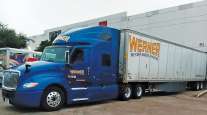Staff Reporter
Wisconsin, Indiana Pass Bills Targeting Lawsuit Abuse

[Stay on top of transportation news: Get TTNews in your inbox.]
Wisconsin legislators passed a bill targeting lawsuit abuse against trucking companies, while their Indiana peers approved legislation OK’ing disclosure of non-seatbelt use to mitigate civil damages in injury claims.
State and national trucking industry stakeholders have applauded both actions and urge Govs. Tony Evers of Wisconsin and Eric Holcomb of Indiana to sign the bills into law.
The trucking industry has been grappling with nuclear verdicts from civil litigation. A recent study by the U.S. Chamber of Commerce noted that nuclear verdicts have ballooned 27.5% from a decade earlier to average $24.6 million.
The Wisconsin Legislature on Feb. 21 passed Senate Bill 613 limiting to $1 million in noneconomic damages (pain and suffering) that can be recovered from a commercial motor vehicle carrier from a court claim involving injury, death or other loss to person resulting from an act/omission by an employee of the commercial motor vehicle carrier while acting within the scope of employment.

Govs. Tony Evers of Wisconsin (left) and Eric Holcomb of indiana
“Wisconsin’s trucking industry is essential to everyone in our state, and rampant lawsuit abuse is impeding our ability to do our job safely and efficiently,” said Neal Kedzie, president of the Wisconsin Motor Carriers Association. “This legislation has broad support in the state Legislature and across the state.”
Testifying in favor of SB 613 was R.J. Pirlot, executive director of the Wisconsin Civil Justice Council Inc., who stated: “Capping damages is not unusual. Wisconsin already caps noneconomic damages in medical malpractice cases to help keep medical malpractice insurance affordable. The limit on noneconomic damages in medical malpractice cases is $750,000.”
The trucking industry and others contend that putting limits on subjective, nonmonetary losses is critical to fairness in civil litigation to deter frivolous lawsuits.

Spear
“When the plaintiffs’ bar perverts civil litigation into a casino game of ‘jackpot justice,’ the costs are borne by everyone — not just trucking companies, but consumers, too, in the form of higher insurance rates and higher prices for everyday goods,” American Trucking Associations President Chris Spear said. “This reasonable reform ensures justice and fairness drive accident litigation outcomes, not profits.”
Earlier in Indiana on Feb. 20, House Bill 1090 was enrolled as a legislative act that now goes to the governor’s desk to amend the Indiana Code concerning transportation. If enacted, the law would take effect July 1. A clause in the proposed act allows evidence of failing to comply with passenger restraint system laws to be admitted in a civil suit to mitigate damages for personal injuries or death experienced by a plaintiff, who was at least 15 years old at the time of the incident and was inside a motor vehicle manufactured after Sept. 1, 1986, and equipped with at least one inflatable restraint system.

Langston
“Indiana’s trucking industry plays a vital role in the everyday lives of Hoosiers, and lawsuit abuse presents a growing obstacle to our ability to deliver life’s essentials safely and efficiently,” said Gary Langston, Indiana Motor Truck Association CEO. “We appreciate the House and Senate for their leadership on this issue and encourage Gov. Holcomb to swiftly sign this bill into law. We look forward to the continued partnership with our state’s leaders on common-sense reforms that stand for justice, fairness and safety.”
COMTO's April Rai offers tips to increase workforce diversity and grow profits.. Tune in above or by going to RoadSigns.ttnews.com.
Spear reacted to the passage of this legislation by noting that Indiana is among many states in recent years to amend “ ‘the so-called seat belt gag rule,’ a legacy of a bygone era when seat belt use wasn’t common and the safety benefit wasn’t universally accepted like it is today. This is a common-sense measure that only increases transparency and ensures jurors have complete information when rendering a fair and just verdict.”
The trucking industries in Indiana and Wisconsin are key providers of middle-class jobs, employing 183,780 people in Wisconsin — where 77% of communities rely exclusively on trucks to receive their goods — and 231,000 Hoosiers. More than 80% of Indiana communities rely exclusively on trucks to receive their goods.
Want more news? Listen to today's daily briefing below or go here for more info:





